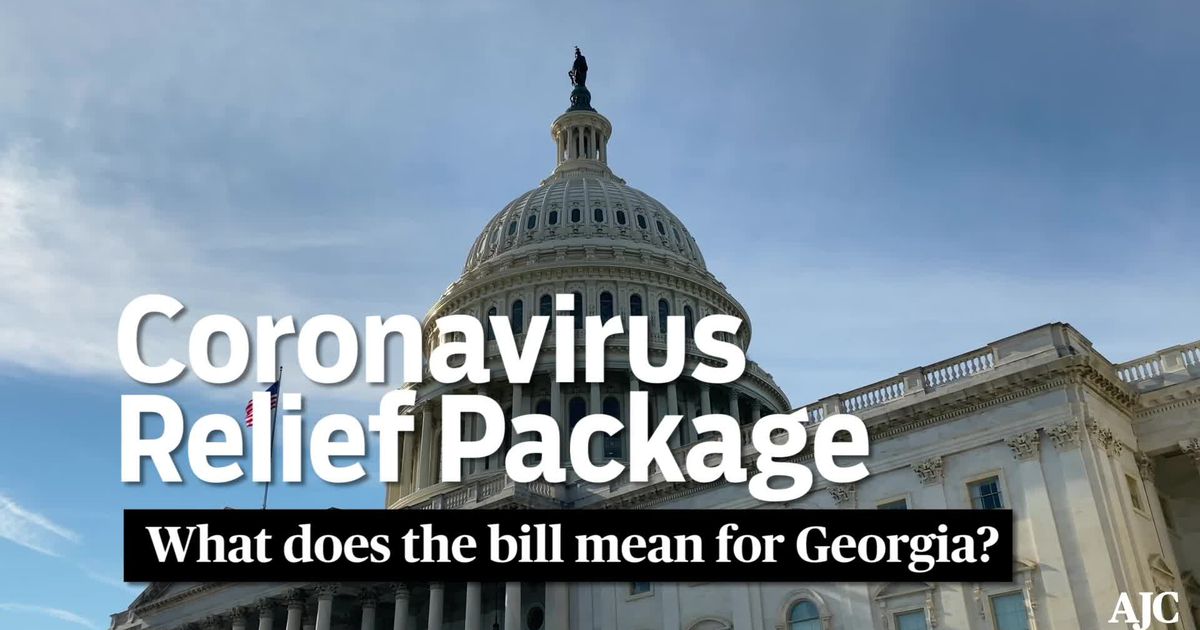Georgia
Latest COVID relief bill promises billions in new funding to Georgia
Published
6 years agoon
Editor

GEORGIA – After watching businesses decimated by the pandemic, Erin Freer kept her two Atlanta hair salons alive with federal aid from the Paycheck Protection Program.
That money kept her 26 employees working, but she estimates it will run out months before the full recovery of the economy — and her business.
“This current round should hold me until around the second week of April,” she said. “Honestly, I don’t know what the fix is if business does not go back to normal soon. I hope I don’t need to find out.”
Proponents of a new round of coronavirus stimulus say the $1.9 trillion proposal is needed to keep households intact, businesses alive and municipalities from shedding tens of thousands of workers — while accelerating the vaccine rollouts that will make a full recovery possible.
In addition to infusing the Paycheck Protection Program with $7 billion in new money, the package includes $1,400 stimulus checks for individuals and an increase of the federal minimum wage to $15 an hour. Formally titled the American Rescue Plan, it also has additional funding streams that would directly benefit Georgia governments and industries.
The state and its agencies could receive $4.7 billion that can be used to avoid laying off workers in health care, transportation and public safety. In addition, Georgia’s 159 counties and cities would share an additional $3.6 billion. The biggest impact on Georgia would be the money going to municipalities, said Raymond Hill, economist and professor at the Goizueta School of Business at Emory University.
“The best way to spend it would be to make sure that those governments do not cut their expenditures,” he said. “To make sure they are not cutting teachers, that kind of thing. That is very efficient stimulus money when it’s spent to keep somebody working.”
Union City, which has 342 employees, froze hiring last year but managed to avoid layoffs, Mayor Vince Williams said.
“We have been a blessed city, but we don’t know how long this is going to last,” he said. “You can use that money for salaries of public safety folks, you can make up lost revenue from property taxes. And we have not been able to assist members of our community with rental assistance or help our small businesses.”
Republican lawmakers have balked at the size of the package and say it includes too many provisions unrelated to COVID-19 relief, such as the minimum wage increase.
Money for the states is being distributed based on a formula that considers the number of unemployed workers. Gov. Brian Kemp said that unfairly penalizes Georgia for doing better than other states such as New York where job losses during the pandemic led to higher unemployment rates.
“Georgians should not be punished by a federal government hoping to tip the scales in favor of other states who chose to decimate their economies,” Kemp wrote in a letter to the state’s congressional delegation that backed revising the formula.
As the pandemic struck, Georgia tried to mitigate both the economic and health damage. The state now ranks almost exactly in the middle of the pack for both death toll per capita and unemployment rate. And while the Georgia economy has grown for eight consecutive months, it remains more than 90,000 jobs shy of pre-pandemic levels.
Some sectors — especially those that benefit from online shopping — have done well. But many are still struggling, especially businesses that rely on in-person transactions or those that are part of the still-crippled travel industry.
Most economists credit the $2.2 trillion CARES Act that passed in March with preventing economic collapse, keeping the jobless from falling into poverty, while preventing the failure of many small businesses. About 400,000 Georgians are still receiving jobless benefits.
A bill that passed in December extended benefits, but only into mid-March. While hope for a post-COVID-19 economy has grown, it depends on the velocity and effectiveness of the vaccination rollout.
In the meantime, another round of help is needed, said Alex Camardelle, a senior policy analyst for the Georgia Budget and Policy Institute.
Use of the SNAP program — what used to be called food stamps — has nearly doubled to 1.8 million families, he said. “One in 5 households with children can’t afford enough to eat. The urgency of passing COVID relief couldn’t be more clear.”
Extending child care tax credits would help, but so would the continued payment of jobless benefits — especially to gig and self-employed workers — he said.
Those workers are not eligible for regular state benefits, he said. “If Congress doesn’t pass the bill by mid-March, an estimated 400,000 Georgians will lose a critical source of income.”
About 43% of the roughly 4.6 million employees in the state work in small businesses, according to the Small Business Administration. And nearly 6 in 10 small businesses in Georgia think the economy is doing poorly, according to a survey for the Connected Commerce Council, a 3-year-old group that promotes use of technology.
For many small companies, survival now hinges on having access to capital, said Jake Ward, council president. If aid to business is not extended, some will face a crunch in the spring, he said.
The Commerce Council, which has 285 Georgia members, sees a combination of PPP, grants and unemployment benefits making a difference for small companies, Ward said. “I am of the mind that it can, that it can be the bridge between ceasing to exist and surviving another day.”
Democrats have the whip hand on the relief package: Republicans can slow the train, but they likely won’t be able to stop it. By using the budget reconciliation process, Democrats can pass it without GOP support.
Republican leaders in the General Assembly last spring asked for relief money for the state.
They did so because they feared tax collections would collapse in the recession after COVID-19, but in fact they’ve increased, putting the state in a far more financially advantageous position than expected.
The General Assembly approved $1,000 bonuses for state employees making less than $80,000 a year, and teachers got the same bonuses. Money the state had earlier gotten from the federal government for COVID-19 relief funded the bonuses.
A state House committee this week also approved a cut in the standard deduction on state income taxes — a $1,100 reduction for married people filing jointly and $800 less for individuals. That would lower tax bills roughly $67, said Usha Rackliffe, professor of accounting at Emory’s Goizueta School. “Every little bit counts. The move is more to help people in the middle class or lower-income families.”
Republican leaders may look to use money from the American Rescue Plan for more tax cuts.
The federal relief bill is expected to receive approval Friday from the House. After that, the Senate could make small changes. The goal is to have the legislation to President Joe Biden no later than March 14, when provisions from previous relief packages will expire.
The $1,400 stimulus checks could go out soon after, fulfilling a promise that Biden and other Democrats made on the campaign trail. Direct payments are a popular idea, garnering the support of 76% of Georgians polled last month.
Democrats say they listened to elected officials and constituents to draft a package that is comprehensive but also gives state and local governments resources to tailor their response to the lingering effects of the pandemic. U.S. Sen. Raphael Warnock said he has pushed to make sure the plan includes provisions targeted to Georgia’s needs, such as funding for Black farmers and historically Black colleges and universities, and money that can be used for school reopenings, vaccine distribution and local programs.
“I’m thinking about places like Carroll County where, despite (the U.S. Centers for Disease Control and Prevention’s) eviction moratorium, families are still facing the threat of eviction if they can’t make their rent,” Warnock said during a press event this week. “These are just some of the people and communities and challenges I’ve had in mind while I’ve been doing this work.”
Warnock and U.S. Sen. Jon Ossoff have also praised a provision increasing the federal reimbursement rate for Medicaid costs, a change they say is designed to offer incentives to states like Georgia to expand Medicaid and reduce the number of uninsured people. Georgia is among 12 conservative states that have declined to implement this portion of the 2010 Affordable Care Act.
The American Rescue Plan also includes $30 billion for transit systems that could trickle down to local transportation agencies such as MARTA, Xpress and Cobb Linc. The package’s $8 billion for airports and $15 billion for the airline industry would have an impact on Atlanta’s Hartsfield-Jackson International Airport and companies such as Delta Air Lines.
As large and broad as this stimulus package is, predicting its overall effect is hard — there are too many uncertainties, said Emory’s Hill.
And despite the state’s distinctions — including more than the average number of jobs in hospitality and travel-related sectors — Georgia will rise or fall with the overall economy, Hill said. “It’s a national program. It’ll either help the whole economy grow — and with it, Georgia — or not.”





